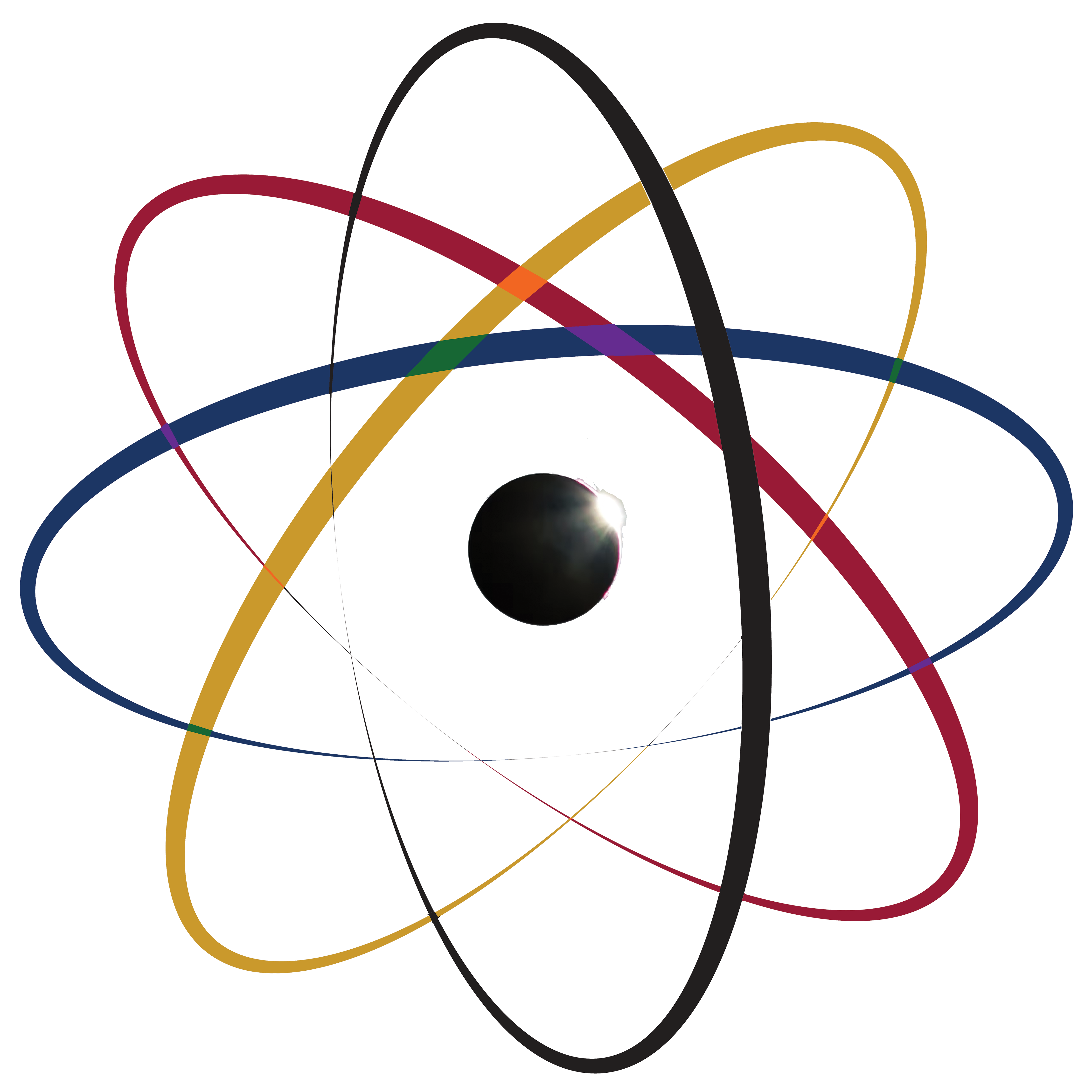Responding to the Era – A Strategic Realignment of Victoria’s Scientific Society
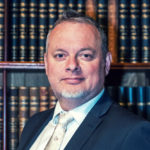 Mike Flattley
Mike Flattley
CEO, The Royal Society of Victoria
There have been few benefits to operating an intrinsically social organisation during “the world’s longest COVID lockdown” here in Melbourne, so let’s celebrate the ample time we have been gifted for reflection! Our Council has been circling the renewal of the Royal Society of Victoria’s mission and strategic goals for many years now, starting out with the production of the first Concord and Progress strategy published back in early 2016. Over the course of the past two years, thanks to the input of many members and supporters of the Society, we have taken the opportunity to re-examine and refocus the Society’s strategic settings, structures and scope of activities in service of our fundamental purpose to advance and promote the sciences in Victoria.
In summary:
- Good science is required to inform good decision making; it is not, in itself, a good decision. Effective decision making is an interaction of due process with the constant variables of education, ethics and the vicissitudes of culture. This assigns scientific literacy as a vital component of effective citizenship, a foundation for distributed leadership and a precursor to a functional liberal or social democracy; by building our individual and collective capacities to act effectively, our knowledge safeguards our rights by helping us fulfil our responsibilities.
- To be activated for the “public good,” scientific research and knowledge must be translated into forms that can be used by communities, industries and governments. Our scientific endeavours must simultaneously and constantly communicate with and draw from a “cultural knowledge” base in order to make their relevance visible to all.
- The Royal Society of Victoria’s role as a convenor of Victoria’s science community must be reinvigorated and extended, taking in the social sciences and stretching to include the sectors and knowledge systems beyond academia. This way, we connect Victorians everywhere with expertise that can enable confident, effective decision making in uncertain conditions – informed, localised responses to issues both global and regional.
- Through a restructured Fellowship program and a concern with discovery, discussion and deliberation, our renewed focus is on the intersection of science and society, with an aim to translate disciplinary expertise into effective actions within each social sector through a process of knowledge exchange – a “feedback loop” between scholars, public servants, private sector experts and community-based knowledge holders that builds and distributes new knowledge.
At Length
The most important recalibration to note is a harder emphasis on translation; a term frequently used to describe the journey of research work “from bench to bedside” in medical science, it is equally as applicable to other fields, particularly in a country renowned for punching well above its weight in research activity yet remaining a trenchantly low consumer of that output in the industrial and community sectors in particular. Clearly, we are not doing enough to make scientific advancements in Earth systems, ecology, sensing, AI, energy, engineering and physics relatable to the people who could most benefit from this engagement in serving their communities, enterprises and sectors.
In terms of “filling a niche,” the Society clearly has work to do in assisting with the “public good” element of translation; while we still champion the economic benefits of local commercialisation of local research outputs, as many research institutions are already capably doing, there are few organisations that focus on the open access, “creative commons” aspect of translating specialised knowledge into what can be termed as “folk knowledge,” mainly because there isn’t really a dollar to be had from it, despite the clear benefits to Victorian communities, economies, governments and environments.
Enter the not-for-profit.

Folk Knowledge, Cultural Knowledge, Scientific Knowledge
An informed population is an empowered population. Scientific literacy is a vital component of effective citizenship, a foundation of distributed leadership and a precursor to a functional liberal or social democracy; it safeguards our rights by helping us fulfil our responsibilities, to one another and the broader economic, cultural and environmental landscape that supports our society. Just as eternal vigilance by a sceptical electorate combats the tendency for established power structures to become moribund or corrupt, a scientifically literate electorate can also more effectively recognise good policy informed by robust research when it comes along; which, I’m happy to say, seems to be happening more regularly of late. The last thing we want is for governments who embrace effective, evidence-based policy to be rewarded at the ballot box with dismissal by a citizenship with outdated “folk knowledge.” So when we say “science is for everyone,” this is really what I’m talking about; nobody can be left behind in the effort to engage if we wish to sustain what we value most about civic life in Victoria.
Alexander Pope warned us that “a little learning is a dangerous thing” back in 1709, referring to the overconfidence of the sparsely informed. While folk knowledge is what keeps us all alive and connected in a complicated world, certain concepts or understandings about “the nature of things” may have been attained long ago during schooling, or from workmates, friends and family members, and thus will retain emotional significance as well as an intellectual pride associated with their attainment – no matter how full of half-truths or misunderstandings a folk knowledge base might be, it is an important component of identity, or even ethnicity, that will be fiercely protected from interference by outsiders. It is an inherently socially conservative part of every one of us, resistant to change and reactive to disruption. Scientific communities are human and must contend with this also. So, it will be important to meet all Victorians “where they are” – offering new tools for use in the context of local culture, partnering to learn new ways of using these tools together, and sustaining that engagement so the tools can change as our scientific knowledge base grows.
Even as we seek to reinform “folk knowledge,” we must also acknowledge that “cultural knowledge” has much to offer scientists in return. People who work with and live on the land grow to know its natural systems intimately, just as people who run households and families, create artistic works, build and maintain infrastructure and financial systems, manufacture goods, provide services and extract primary resources have specialised knowledge to offer. To take this deeper, we can look to the Royal Society of Victoria’s recent engagement with Aboriginal and Torres Strait Islander knowledge systems, developed over tens of thousands of years through elaborate systems of intergenerational memory and ritual, deeply embedded in cultural practices so as to be virtually indistinguishable from identity. This offers a wake-up call to Western science which is, for all its achievements, scarcely a millennium old at the most generous measure, and is yet to effectively articulate from the realm of specialised knowledge to the practice of culture at the local level. If we take the practice of ecological science into account, Western science seems to come up short – yes, we’re good at classifying things by kingdoms, families and species, which aligns with our rapidly growing understanding of genetics, but do we understand how a particular lizard relates to a particular plant relates to a particular creek relates to a particular bird, or how songs, dances and rituals can sustain that knowledge, or how it’s all written in the patterns of the stars and seasons for all to read? There are many other ways of classifying “the nature of things,” and it seems there are knowledge systems holding lessons that might directly inform the work ahead of us as a whole community of Victorians journeying together through time in the south-east corner of an ancient yet changing continent.
To a very real extent, we need to establish and embrace a new system of cultural knowledge for everyone, informed by and informing our rapidly expanding understanding of the world around and within us in the knowledge enterprise. We cannot afford to leave anyone behind.
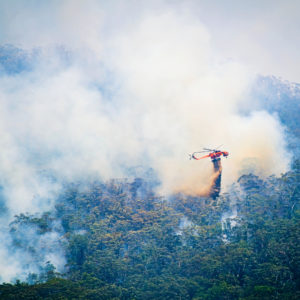 We are seeing falling rates of literacy in Science, Technology, Engineering and Mathematics (STEM) in our primary and secondary schooling, technologies that emerge and evolve faster than our cultural, ethical and legal landscapes can keep pace, and populations increasingly disconnected from the natural systems that support all life on our planet. Vested and sectarian interests exploit the communication technologies created to connect and inform us to instead promote conflict and confusion through misinformation and political theatre. Meanwhile, we face the twin threats of climate change and mass biodiversity loss transforming life on Earth within the lifespan of school-aged children, with few places feeling the effects more than Australia, already a continent of extremes.
We are seeing falling rates of literacy in Science, Technology, Engineering and Mathematics (STEM) in our primary and secondary schooling, technologies that emerge and evolve faster than our cultural, ethical and legal landscapes can keep pace, and populations increasingly disconnected from the natural systems that support all life on our planet. Vested and sectarian interests exploit the communication technologies created to connect and inform us to instead promote conflict and confusion through misinformation and political theatre. Meanwhile, we face the twin threats of climate change and mass biodiversity loss transforming life on Earth within the lifespan of school-aged children, with few places feeling the effects more than Australia, already a continent of extremes.
Sense Making for Decision Making
Many of these challenges are global in scale, yet local in expression; others are unique to our country and our state. We will need an epidemic of wisdom, intelligence, know-how, assurance and cooperation to successfully confront and come to terms with this era and its disruptions.
When we talk about bringing people together, role and function are important to keep clear – for example, science is a tool that gives us valuable information, but not a wise decision, which is a function of inclusive, balanced deliberation by thinking people with an ethical and functional stake in a positive outcome.
Our Society’s role as a convenor of Victoria’s science community must be reinvigorated and extended, taking in the social sciences and stretching to include the sectors and knowledge systems beyond academia. This way, we connect Victorians everywhere with expertise that can enable confident, effective decision making in uncertain conditions – informed, localised responses to issues both global and regional.
We’ve started work on a strategic plan to help us navigate the scale of these challenges and our role within them. A snapshot of the longer document is provided below. I will be sharing our thoughts with other RSV members in the coming weeks to seek your further reflection, guidance and input.
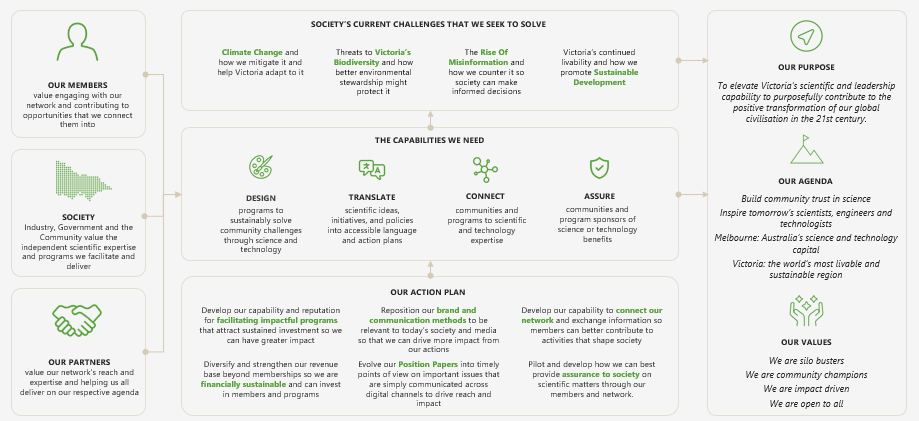
Strategies are never ‘final’ – they are living documents that guide an organisation’s course over years, even decades, so opportunities to review, refine or revise our strategy should be a feature of our Society’s planning cycle. Regardless, to enable effectual progress towards strategic goals, we must remove structural impediments to positive change and put in place procedures and regulations to guide the conduct of new activities. Accordingly, there are a few immediate initiatives to draw your attention to.
A New Focus on RSV Fellowship – a College for Science and Society
Recently, the appointment of Fellows of the RSV has been something of an award for a “job well done,” whether in scientific careers or as a long-standing Member and leader of the Society. Acknowledging that we must maintain acknowledgement of career achievements in our merit criteria, we now seek to appoint our Fellows at “mid-career” phase; people actively pursuing their professional goals and seeking to make a change in the world through effective knowledge leadership.
Our Fellows are now to be explicitly appointed as a “brains trust” for the Society and its Members across the disciplines, to be called upon to provide expertise, speak for the Society on matters requiring extensive command of disciplinary or sectoral complexity, and champion the Society’s mission within their networks.
Our focus is on the intersection of science and society, with an aim to translate disciplinary expertise into effective actions within each social sector through an interdisciplinary process of knowledge transfer – a “feedback loop” between scholars, public servants, private sector experts and community-based knowledge holders that builds and distributes new knowledge.
Accordingly, we have set out a new structure to populate our new College with excellent individuals, drawing on knowledge leadership across the sectors of Academia, Government, Industry and Community. We are aiming for parity in representation between women and men, and those with non-binary gender identities are eligible to take up places otherwise reserved for a man or a woman.
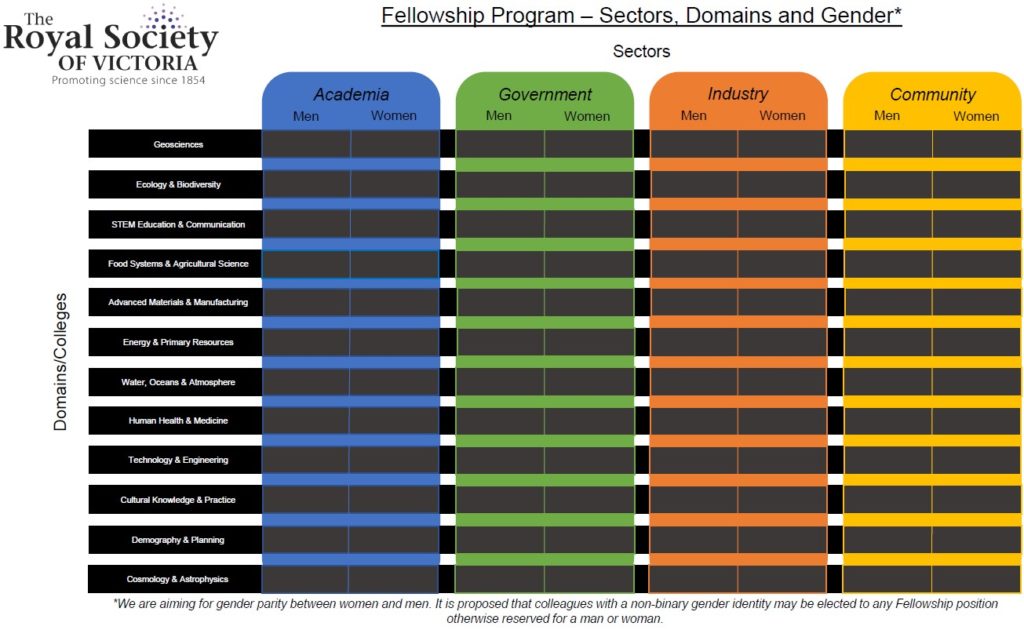
This revitalised program seeks to establish a growing and enduring corpus of effective, influential, future-focused thought leaders to help our broader membership appreciate the progress made in diverse fields of endeavour, test ideas with experts and participate in deliberative forums informed by robust research and activated through effective networks for impact.
Beyond the labour involved in setting up the new structure and piloting the Member Forums in 2022, the new program will mean a realignment of the RSV’s administrative work, including support for:
- Engagement and consultation with RSV Members to generate the themes/focus of quarterly Forums
- Engagement and consultation with RSV Fellows to populate panels with appropriate expertise
- Engagement and consultation with institutional partners to build an aligned program of public engagement, e.g., evening keynotes at Parliament, National Science Week activities, community network partnerships
- Sourcing nominations and conducting election processes with RSV Fellows to appoint new Fellows
- Building and ticketing Forums
- Running proceedings and articulating Members with aligned partner events
- Commissioning and publishing peer-reviewed papers from the Forums (“Proceedings”)
- Summary articles on proceedings/outcomes (“Transactions”)
- Commissioning RSV position papers/report cards from proceedings, conducting further consultation processes with RSV Members and Fellows and stewarding approval processes through RSV Council
- Marketing and media campaigns, appointment and management of RSV spokesperson surrounding the release of each position paper/report card
This administrative work will supplant much of the current effort undertaken in convening our annual lecture series which, while popular after the fact when filmed and shared via social media, has been sparsely attended by our Members for many years. We will sustain our long-running lecture series, a feature of Melbourne’s culture for 160 years, albeit with less frequency of events.
Constitutional Changes
The Society’s Rules require amendment to reduce our administrative burden, freeing up resources to pursue our mission. We last approached this challenging task in 2019, when we enabled the Society to take on aligned organisations as “affiliates.” This time, we seek to:
- Streamline the process through which a person applies to become and is subsequently deemed to be elected as a Member of the Royal Society of Victoria
- Streamline the process of Membership subscription renewal, recognising the capacities enabled by digital subscription services
- Reduce the requirement for Ordinary Meetings of the Society to four per year in order to accommodate a renewed emphasis on membership forums, symposia and other labour-intensive deliberative processes, in addition to the Society’s outreach and partnerships work
- Acknowledge that polling software may be used to conduct our General Meetings
- Maintain the role of Immediate Past President as an ex-officio Council member to retain the Society’s corporate memory, without imposing the further obligation to also join the Executive Committee
The proposed amendments are here circulated (Word document, tracked changes) for feedback from Members ahead of voting at the RSV’s Annual General Meeting in May. I would prefer to rehearse the detail of any suggested amendments ahead of the meeting in the interests of time spent well together on the night please, so your response is sought via email, and can be further explored in a meeting if there are finer points to discuss.
Affiliation
We cannot take on this expanded community-facing role alone – our resources are scant, and we need to partner with, federate or otherwise augment the voices and efforts of aligned organisations.
Notwithstanding that our constitution has made room for affiliating like-minded organisations with the Society, as yet we lack a formal procedure to govern the process through our By-Laws. In the coming months we’ll be inviting a number of organisations to be our first affiliates, offering mediated access to our facilities, communication channels and governance structures in pursuit of common goals. As outlined in our Rules, these affiliation agreements will be advertised to Members in Science Victoria a month ahead of formal adoption.
My gratitude to our Council members and those Members participating in the Future Focus Committee meetings for your guidance and kind assistance in developing these new structures and processes, particularly to our newest Councillor, Richard Blundell, who has contributed a great deal of his time and expertise to our strategic planning work, to our Secretary Jeffrey Luckins, who is driving our affiliation process along wonderfully, and to our energetic champion for change, RSV President Rob Gell.



